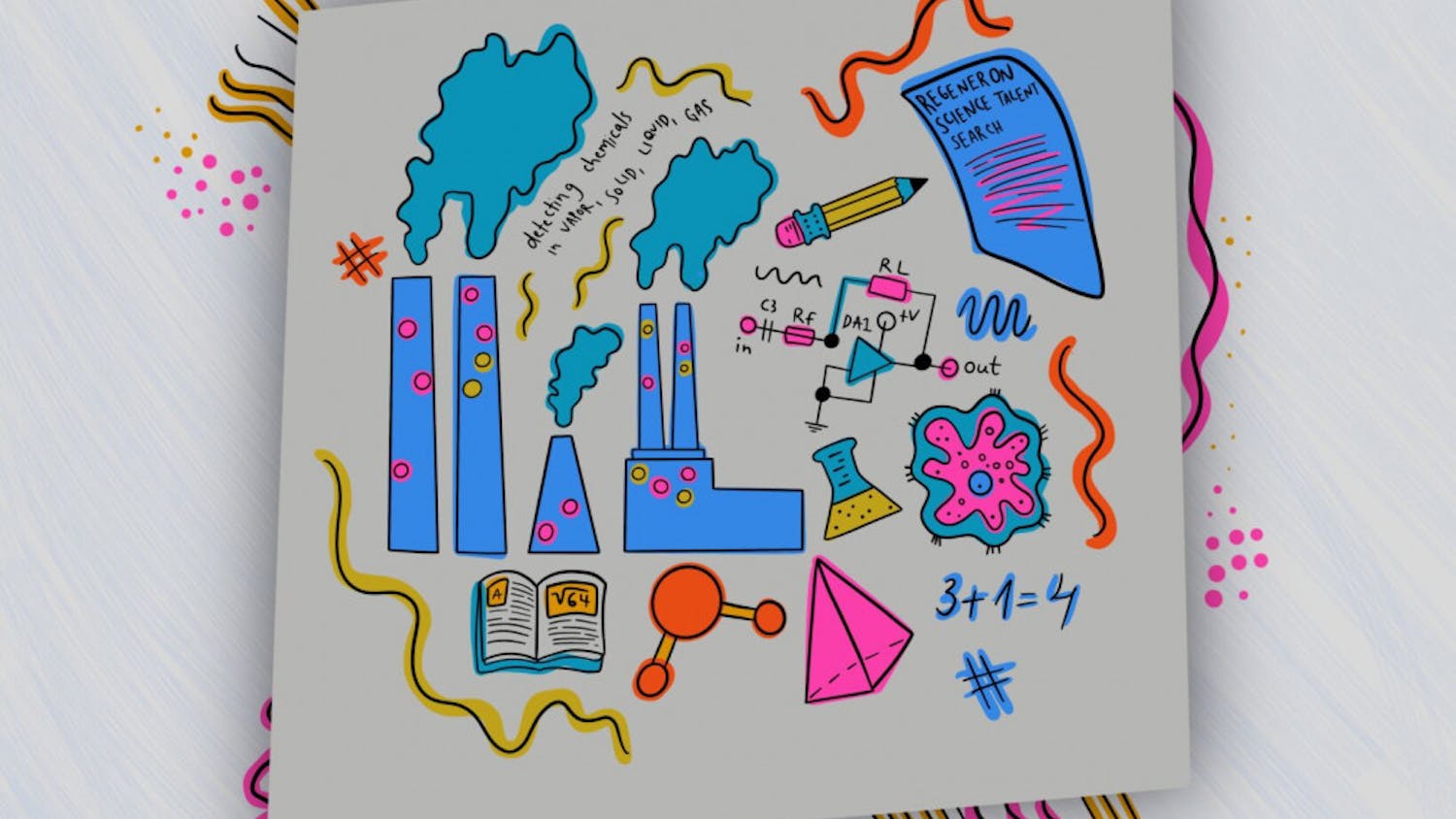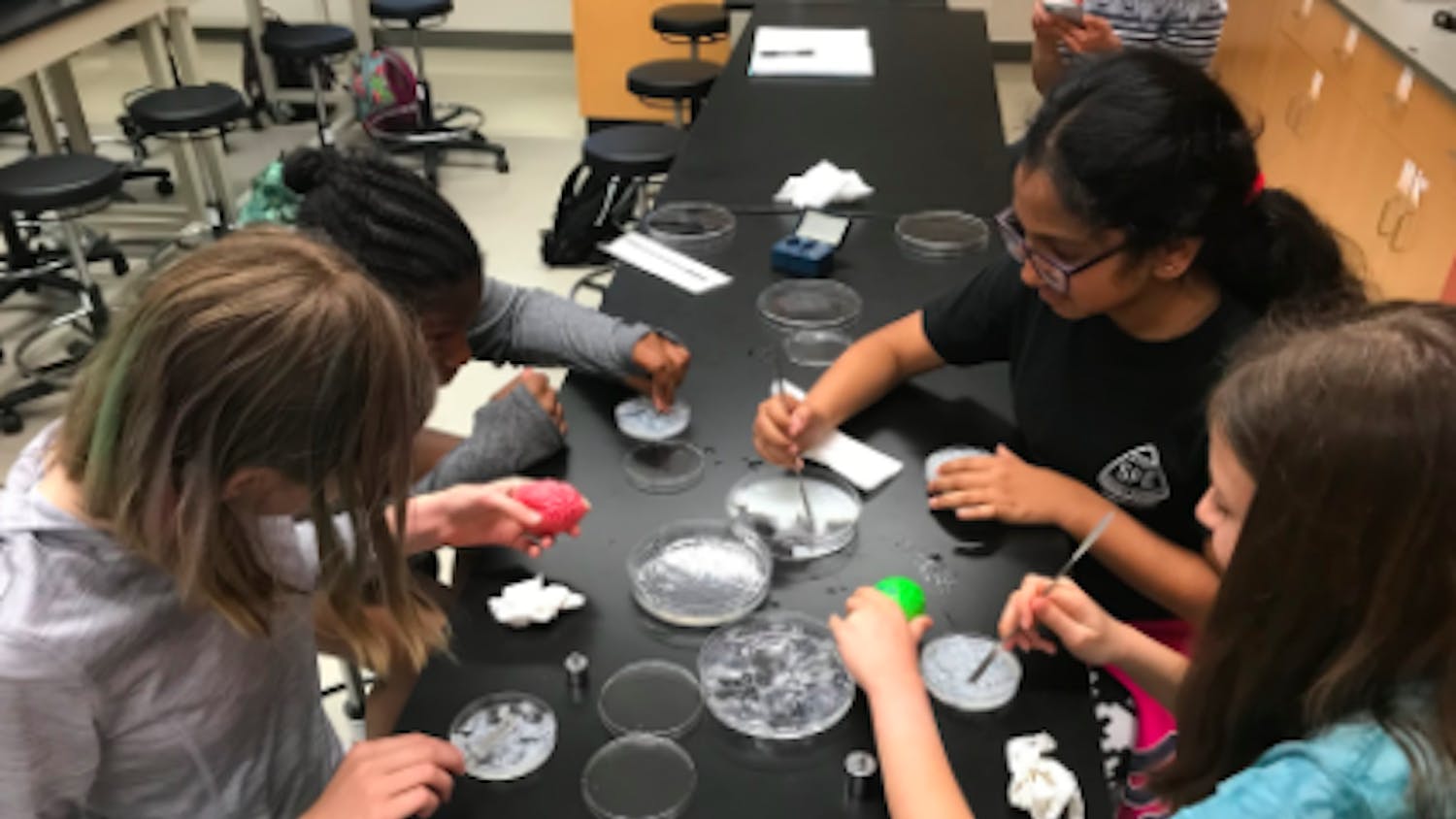Editor's note: The editorial board would like to apologize for several erroes contained in this article.
“Let me show you how my mind works,” says the 20-year-old.
He pulls out a piece of paper and replicates a pattern he discovered in the bathroom. Every tile in the bathroom alternates colors, so Michael Rodeman fills in some of the squares on the paper and leaves some blank.
Soon, he draws varying sizes of squares. With a 2-by-2 or 3-by-3 square, there are two options for the color arrangement. But once you reach a 4-by-4 square you’ve reached the maximum of four options; any more tiles per side won’t affect the pattern.
It’s not a meaningful problem. The solution won’t send astronauts to Mars, but it’s what Rodeman does. He solves problems — even on the toilet.
Rodeman, a math sophomore at UF who prefers magic and juggling to partying and drinking, defied the homeless background he came from to become a 4.0 GPA-bearing, national-math-contest winning college student with the potential to solve the world’s problems.
Ever since he figured out multiplication tables in fourth grade, math is everything Rodeman has done.
During his sophomore year at Middleton High School in Tampa, about the time that his family was bouncing around from friend’s house to friend’s house, even living in a hotel at one point, his geometry teacher persuaded him to join the math team.
According to Chris Lawyer, his calculus teacher at Middleton, Rodeman became a sort of mascot or class clown on the team.
His mom, Susan Rodeman, told everyone who visited wherever they were living that Rodeman was a genius.
The family didn’t have much — the only food they could afford to buy were pancakes.
“I always heard the school meals were crap. I always thought those people were ungrateful,” he said. “I was like, ‘This is the best thing I ever tasted!’”
Despite the hard times, his mom and dad, Thomas, picked him up from after-school math practices. On Jan. 10, 2007, at 4:30 p.m. — Rodeman spouted the date and time as soon as he was asked — Susan was driving with her husband to pick their son up from a mid-week practice when she died of a heart attack caused by stress.
Her heart failed, her son said, because she wasn’t able to give her children what she wanted for them.
“I’ve never seen my dad cry before, but he said he cried,” Rodeman said. “I’ve never, never seen him cry.”
Rodeman, who was 16 at the time, poured himself into his math textbooks. In addition to the Monday team meetings and the ever-increasing mound of college applications, he continued to press forward with his studies.
In his application essay to the Massachusetts Institute of Technology, according to the St. Petersburg Times, he wrote math was his way of coping with his loss.
Mu Alpha Theta, the national math competition organization, keeps tests used in previous competitions. In his categories, Rodeman took every historic practice test — about a thousand tests in total.
“He’d talk about math sometimes,” Lawyer said, “but he just didn’t have normal human conversation, like weather or sports or anything. Sometimes, if he was around a lot of strangers, he’d kind of bottle up.”
He won first place in his division at a regional math competition the fall of 2007, which is when the St. Petersburg Times first published a story about Rodeman’s success at the competition despite his family’s poverty and his mother’s death.
His senior year of high school, he won first place in the nation for a geometry category and second place for a calculus category.
When applying to college, four application fees were waived, so he planned it logically:
One in-state university he knew he would get into: the University of South Florida.
One in-state university that had a nice program: the University of Florida.
One out-of-state university that had a nice program: Georgia Institute of Technology.
And one dream school: MIT.
He was accepted to all of them but MIT. Yale University even sent him a letter, he said, asking him to apply, but he couldn’t afford the pricey application fee.
So he came to UF.
His freshman year, he found a juggling club, a magic club and a math club.
But outside of club meetings and events, he spent at least three hours a day doing non-class-related math work, just things that piqued his interest, things like making patterns out of bathroom tiles.
At UF, he can eat three meals a day through the meal plan provided by financial aid.
In his freshman year, he added a minor in astronomy. He loves Carl Sagan, outer space, stars, and black holes.
And as he struggles with the big issues of life, he added another minor this past semester, this one in philosophy.
Rodeman was never political in high school, Lawyer said. He was still surprised that Rodeman was a part of the protests against the International Burn a Koran Day at Dove World Outreach on Sept. 11.
After that day, Rodeman joined the Students for a Democratic Society, participating in petitions and rallies like the Anti-Police Brutality Rally on March 2.
At SDS meetings, he doesn’t speak up. He usually just nods in agreement.
Since the Quran burning protest, Rodeman has attended all of the Monday SDS meetings. He stumped for the Progress Party. He even accepted fellow SDS member Jeremiah Tattersall’s offer to join a book club that was reading Karl Marx’s “Das Kapital,” although he doesn’t necessarily agree with the book’s tenets. And as if the 1,152 pages weren’t enough, Rodeman decided to buy a commentary, and he has not only kept up with the reading, but he’s also watched video lectures on each of the chapters.
But still, amid the petitioning, picketing and philosophizing, he tries to solve the math questions of his universe.
A few weeks ago, he noticed there were barriers that bottle-necked one of the sidewalk’s traffic, so he stopped walking and pondered. He viewed the sidewalk traffic through the lens of differential equation and started to figure out what sets of data he would need to determine how much people slow down when they walk through the barriers and how much they speed up once they’re past the barriers.
There’s no equation to explain why he loves solving problems; he just does.
But maybe part of that mind can never actually turn off.
When Rodeman collected petitions for underpaid tomato pickers, he counted the names. There were 1,511 names.
“Hmm, I wonder,” he thought, “if that’s a prime number.”
So he calculated in his head; it was, in fact, a prime number.
Rodeman is the type of person who, despite his excitement, prefers to let others do the talking. In class, he usually just takes notes.
Even though he prefers being quiet, he loves political activism and philosophy, which he said
“I think it’s close to math because you have to be logical,” he said of philosophy. “But that’s the only thing in philosophy that’s also in math, logic.”
But there has to be more than just that. What about the meaning of life?
“I have no idea,” he said laughing before figuring out the answer. “Forty-two. That’s the purpose of life.”





